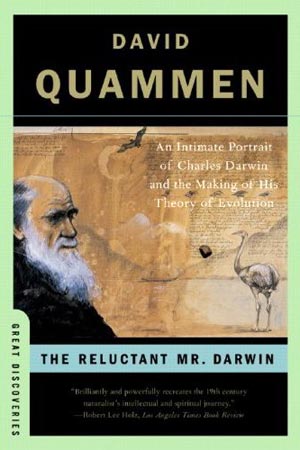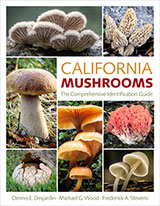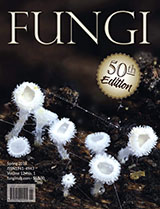Book Review
The Reluctant Mr. Darwin:
An Intimate Portrait of Charles Darwin and the Making of His Theory of Evolution
I’m going to come clean right up front: this book has nothing to do with mushrooms or other fungi. At all. But as it is the bicentennial year of Charles Darwin’s birth and sesquicentennial of his seminal On the Origin of Species I feel that a brief callout to this book by David Quammen is warranted. Plus, this is a terrific book.
I first became familiar with David Quammen when the November 2004 issue of National Geographic magazine showed up in my mailbox. Emblazoned across the cover in large red letters was: “WAS DARWIN WRONG?” That’s the kind of thing that gets the attention of any biologist, so I immediately sat down to read.
 Quammen’s writing style is very well researched, but engaging and accessible to anyone. While Darwin’s is a household name, most readers probably couldn’t cite anything about the man save his famous voyage on the ship HMS Beagle and ensuing “discovery” of evolution (which isn’t quite accurate, anyway). With The Reluctant Mr. Darwin, Quammen avoids those five years (on the Beagle) of Darwin’s life—they’ve been adequately covered by dozens of previous authors—and throws open a window into the life of Charles Darwin, both before and after his tremendous journey. The author paints a portrait of a man who was reclusive, spending long hours each day, seven days a week, for years in the exhaustive study of the taxonomy of barnacles. As well as the breeding of show pigeons. And the breeding and taxonomy of plants. And beetles. From his beginnings, Darwin loved beetles and forayed for them tirelessly. Quammen recounts one such foray where Darwin tore through a rotting log and spotted a rare species and grabbed it up. Another was spotted and quickly grabbed up. Then, when he had seen “a third and new kind, which I could not bear to lose, so that I popped the one which I held in my right hand into my mouth. Alas it ejected some intensely acrid fluid, which burnt my tongue so that I was forced to spit the beetle out” allowing two of the three to get away from the dejected Darwin.
Quammen’s writing style is very well researched, but engaging and accessible to anyone. While Darwin’s is a household name, most readers probably couldn’t cite anything about the man save his famous voyage on the ship HMS Beagle and ensuing “discovery” of evolution (which isn’t quite accurate, anyway). With The Reluctant Mr. Darwin, Quammen avoids those five years (on the Beagle) of Darwin’s life—they’ve been adequately covered by dozens of previous authors—and throws open a window into the life of Charles Darwin, both before and after his tremendous journey. The author paints a portrait of a man who was reclusive, spending long hours each day, seven days a week, for years in the exhaustive study of the taxonomy of barnacles. As well as the breeding of show pigeons. And the breeding and taxonomy of plants. And beetles. From his beginnings, Darwin loved beetles and forayed for them tirelessly. Quammen recounts one such foray where Darwin tore through a rotting log and spotted a rare species and grabbed it up. Another was spotted and quickly grabbed up. Then, when he had seen “a third and new kind, which I could not bear to lose, so that I popped the one which I held in my right hand into my mouth. Alas it ejected some intensely acrid fluid, which burnt my tongue so that I was forced to spit the beetle out” allowing two of the three to get away from the dejected Darwin.
Charles Darwin became engrossed with the idea of island biology and biogeography. How could species have gotten there if not placed directly there by God? And if so, why did He make related species unique to each island of an island chain? If islands were populated by plants whose seeds had washed up on island shores from distant lands (or adjacent islands), how long could they persist in seawater and yet be viable? Darwin had experiments to delve into all these mysteries, and more, and he had them set all around his expansive estate. Seeds soaking in saltwater, bird and mammal corpses in different states of decay or preservation, coveys of pigeons, and bench tops covered with microscopes and ink illustrations. Darwin’s days were spent in tireless investigation.
All the while Darwin was sickly (as were several of his offspring); his illness resulted in daily bouts of vomiting (at its most benign) or kept him bed ridden for days at a time (during acute spells). His frail health led him to seek out spas with reputed healing waters. Several times the “cures” resulted in Darwin becoming ever more ill.
Darwin was a gregarious and voracious reader, taking in ideas from all sorts of sources. Clearly he was greatly influenced by the writings of Thomas Malthus and the notion of too many individuals competing for limited resources (the “struggle for survival”) became the driving force behind his conclusions about Natural Selection. He noted that from the Malthusian struggle involving “death, famine, rapine, and the concealed war of nature” had come the creation of the varied organisms of the planet “through the process of gradual selection of infinitesimal changes, endless forms most beautiful and most wonderful have been evolved.” And although we now know that there is more to evolution than Natural Selection, the latter is held up as the driving force behind the former (at least according to most authorities). Genetics plays a big role but Darwin had no concept of genetics (but his best guesses, although pretty far off base, make for entertaining reading). It’s ironic that at the same time Darwin was getting everything exactly right about evolution—except for how traits were modified and inherited—someone was toiling away on the other side of Europe in a patch of garden peas and making astounding discoveries that would unlock the secrets of how inheritance fuels Natural Selection with pools of different traits to sift through. Alas, the world would have to wait until after Darwin to “rediscover” the long lost work of Gregor Mendel which would add the final piece to the evolutionary puzzle.
In The Reluctant Mr. Darwin we see a man that was a thorough researcher, literally, to a fault. As an example, Darwin would not publish his treatise on marine barnacle taxonomy until he had exhaustively and painstakingly examined and illustrated the features of hundreds of specimens from dozens of species. Between the time when Darwin completed his singular voyage and first came up with his “Grand Idea” of “descent with modification” (evolution) of living organisms, 20 years had lapsed. All the while he was gathering more evidence and writing. Always writing. It’s likely that On the Origin of Species would still be a work in progress were it not for the fact that another researcher, on the other side of the planet, had come to the exact same conclusions as Darwin. Alfred Russell Wallace was a bug collector and seller and found fertile ground in the Indonesian Archipelago. We now know that island biogeography can lead to rapid speciation which did not go unnoticed by Darwin, nor Wallace. Alfred Russell Wallace, a more expedient writer than Darwin, wrote up his manuscript on the evolution of organisms in Indonesia…but where to send it for peer review prior to publication? Maybe it was serendipity or maybe it was due to the fact that few biologists of the day—besides Darwin—were explaining life outside the dogma of special creation, but Wallace’s manuscript wound up on Darwin’s desk. And Darwin panicked. He was about to be scooped on the very discovery he’d been laboring with for 20 years. For different people there are different motivational forces and for Darwin it was Alfred Russell Wallace.
The Reluctant Mr. Darwin is part of the “Great Discoveries” series published by Atlas Books, an imprint of Norton. Another in the series that I can highly recommend is The Doctor’s Plague (by Sherwin B. Nuland) about the Hungarian physician Ignác Semmelweis and his contribution to the discovery of the Germ Theory. Semmelweis’s, like Darwin’s, is a strange and wonderful story.— Review by Britt Bunyard
— Originally published in Fungi


